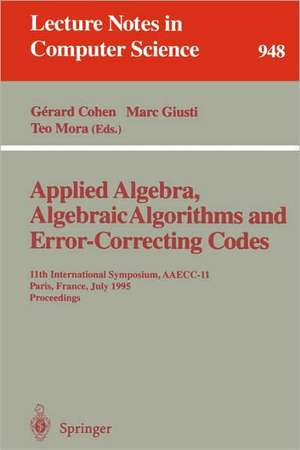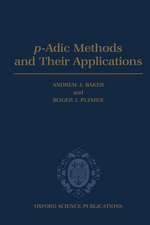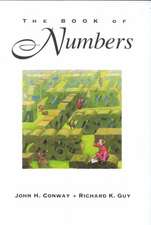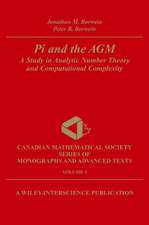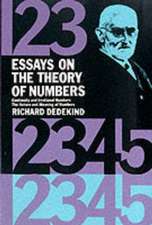Applied Algebra, Algebraic Algorithms and Error-Correcting Codes: 10th International Symposium, AAECC-10, San Juan de Puerto Rico, Puerto Rico, May 10-14, 1993. Proceedings: Lecture Notes in Computer Science, cartea 673
Editat de Gerard Cohen, Teo Mora, Oscar Morenoen Limba Engleză Paperback – 20 apr 1993
Din seria Lecture Notes in Computer Science
- 20%
 Preț: 1061.55 lei
Preț: 1061.55 lei - 20%
 Preț: 341.95 lei
Preț: 341.95 lei - 20%
 Preț: 369.12 lei
Preț: 369.12 lei - 20%
 Preț: 645.28 lei
Preț: 645.28 lei - 20%
 Preț: 591.51 lei
Preț: 591.51 lei - 15%
 Preț: 580.46 lei
Preț: 580.46 lei -
 Preț: 410.88 lei
Preț: 410.88 lei - 20%
 Preț: 504.57 lei
Preț: 504.57 lei -
 Preț: 381.21 lei
Preț: 381.21 lei - 20%
 Preț: 340.32 lei
Preț: 340.32 lei - 20%
 Preț: 1414.79 lei
Preț: 1414.79 lei - 20%
 Preț: 538.29 lei
Preț: 538.29 lei - 20%
 Preț: 583.40 lei
Preț: 583.40 lei - 20%
 Preț: 1075.26 lei
Preț: 1075.26 lei - 20%
 Preț: 238.01 lei
Preț: 238.01 lei - 17%
 Preț: 360.19 lei
Preț: 360.19 lei - 20%
 Preț: 438.69 lei
Preț: 438.69 lei - 20%
 Preț: 1183.14 lei
Preț: 1183.14 lei - 20%
 Preț: 596.46 lei
Preț: 596.46 lei - 15%
 Preț: 438.59 lei
Preț: 438.59 lei - 20%
 Preț: 655.02 lei
Preț: 655.02 lei - 20%
 Preț: 649.49 lei
Preț: 649.49 lei - 20%
 Preț: 309.90 lei
Preț: 309.90 lei - 20%
 Preț: 337.00 lei
Preț: 337.00 lei -
 Preț: 449.57 lei
Preț: 449.57 lei - 20%
 Preț: 310.26 lei
Preț: 310.26 lei - 20%
 Preț: 1024.44 lei
Preț: 1024.44 lei - 20%
 Preț: 579.30 lei
Preț: 579.30 lei - 20%
 Preț: 763.23 lei
Preț: 763.23 lei - 20%
 Preț: 453.32 lei
Preț: 453.32 lei - 20%
 Preț: 575.48 lei
Preț: 575.48 lei - 20%
 Preț: 585.88 lei
Preț: 585.88 lei - 20%
 Preț: 326.98 lei
Preț: 326.98 lei - 20%
 Preț: 825.93 lei
Preț: 825.93 lei - 17%
 Preț: 427.22 lei
Preț: 427.22 lei - 20%
 Preț: 763.23 lei
Preț: 763.23 lei - 20%
 Preț: 350.21 lei
Preț: 350.21 lei - 20%
 Preț: 307.71 lei
Preț: 307.71 lei - 20%
 Preț: 580.93 lei
Preț: 580.93 lei - 20%
 Preț: 340.32 lei
Preț: 340.32 lei - 20%
 Preț: 343.62 lei
Preț: 343.62 lei - 20%
 Preț: 583.40 lei
Preț: 583.40 lei - 20%
 Preț: 583.40 lei
Preț: 583.40 lei -
 Preț: 389.48 lei
Preț: 389.48 lei - 20%
 Preț: 353.50 lei
Preț: 353.50 lei - 20%
 Preț: 607.39 lei
Preț: 607.39 lei
Preț: 392.60 lei
Nou
Puncte Express: 589
Preț estimativ în valută:
75.14€ • 78.15$ • 62.97£
75.14€ • 78.15$ • 62.97£
Carte tipărită la comandă
Livrare economică 13-27 martie
Preluare comenzi: 021 569.72.76
Specificații
ISBN-13: 9783540566861
ISBN-10: 3540566864
Pagini: 372
Ilustrații: X, 362 p.
Dimensiuni: 155 x 235 x 20 mm
Greutate: 0.52 kg
Ediția:1993
Editura: Springer Berlin, Heidelberg
Colecția Springer
Seria Lecture Notes in Computer Science
Locul publicării:Berlin, Heidelberg, Germany
ISBN-10: 3540566864
Pagini: 372
Ilustrații: X, 362 p.
Dimensiuni: 155 x 235 x 20 mm
Greutate: 0.52 kg
Ediția:1993
Editura: Springer Berlin, Heidelberg
Colecția Springer
Seria Lecture Notes in Computer Science
Locul publicării:Berlin, Heidelberg, Germany
Public țintă
ResearchCuprins
Sequence based methods for data transmission and source compression.- On the apparent duality of the Kerdock and Preparata codes.- Bounds for codes as solutions of extremum problems for systems of orthogonal polynomials.- Systems of algebraic equations solved by means of endomorphisms.- Criteria for sequence set design in CDMA communications.- Using Groebner bases to determine the algebraic and transcendental nature of field extensions: Return of the killer tag variables.- A “Divide and conquer” algorithm for Hilbert-Poincaré series, multiplicity and dimension of monomial ideals.- An efficient algorithm for the sparse mixed resultant.- Some features of binary block codes for correcting asymmetric errors.- Fixed-parameter complexity and cryptography.- A class of algebraic geometric codes from curves in high-dimensional projective spaces.- A new class of sequences: Mapping sequences.- A zero-test and an interpolation algorithm for the shifted sparse polynomials.- Parallelization of quantifier elimination on a workstation network.- Hyperplane sections of fermat varieties in P 3 in char. 2 and some applications to cyclic codes.- Analysis of Coppersmith's block Wiedemann algorithm for the parallel solution of sparse linear systems.- Relations among Lie formal series and construction of symplectic integrators.- Exponential sums as discrete fourier transform with invariant phase functions.- Application of finite fields to memory interleaving.- An elementary proof of a partial improvement to the Ax-Katz Theorem.- Energy functions associated with error-correcting codes.- On determining all codes in semi-simple group rings.- On hyperbolic cascaded Reed-Solomon codes.- Peak-shift and bit error-correction with channel side information in runlength-limited sequences.- On athird order differential equation whose differential Galois group is the simple group of 168 elements.- Approximating the number of error locations within a constant ratio is NP-complete.- Two chosen-plaintext attacks on the Li-Wang joint authentication and encryption scheme.- Some constructions of perfect binary codes.
